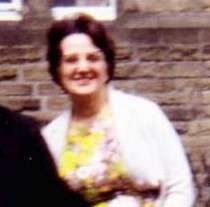Cicely Popplewell
Cicely Mary Williams (née Popplewell) 29 October 1920 – 20 June 1995 was a British software engineer who worked with Alan Turing on the Manchester Mark 1 computer.
Cicely Williams | |
|---|---|
 | |
| Born | Cicely Mary Popplewell 29 October 1920 Stockport, England |
| Died | 1995 (aged 74–75) Buxton, England |
| Alma mater | University of Cambridge (BA, MA) |
| Known for | Work on Manchester Mark 1 and Ferranti Mark 1 |
| Spouse(s) | George Keith Williams |
| Scientific career | |
| Fields | Software engineering |
| Institutions | University of Manchester |
| Influences | Alan Turing |
Early life and education
Popplewell was born on 29 October 1920 in Stockport, England.[1] Her parents were Bessie (née Fazakerley) and Alfred Popplewell, a chartered accountant. She attended Sherbrook Private Girls School at Greaves Hall in Lancashire.[2] She studied the Mathematical Tripos at the University of Cambridge[3][4] where she worked with statistics in the form of punched cards.[3] She was considered an expert in the Brunsviga desk calculator.[5] She graduated with a Bachelor of Arts degree in 1942, which was converted to a Master of Arts degree in 1949 from Girton College, Cambridge.[6][7]
Career
In 1943 she was a Technical Assistant in the Experimental Department at Rolls Royce Ltd. and joined the Women's Engineering Society.[4]
In 1949 Popplewell joined Alan Turing in the Computer Machine Learning department at the University of Manchester to help with the programming of a prototype computer.[8][9] At first she shared an office with Turing and Audrey Bates, a University of Manchester mathematics graduate.[10][11] Her first role was to create a library for the prototype Manchester Mark 1.[12] This included input/output routines and mathematical functions, and a reciprocal square root routine.[12] She worked on ray tracing.[12] She wrote sections of the subroutines for functions like COSINE.[13] Together they designed the programming language for the Ferranti Mark 1.[14][15] She wrote the Programmers Handbook for the Ferranti Mark 1 in 1951.[16] Whilst Turing worked on Scheme A, an early operating system, Popplewell proposed Scheme B, which allowed for decimal numbers, in 1952.[17][18]
Popplewell went on to become an advisor and administrator in the newly formed University of Manchester Computing Service where she was remembered as a 'universally liked' mother-figure.[19] She left the Service in the late 1960s shortly before her marriage.
Popplewell taught the first ever programming class in Argentina at the University of Buenos Aires in 1961.[20][21][22] Her class there included the computer scientist Cecilia Berdichevsky.[20] She was supported by the British Council.[23] Popplewell published the textbook Information Processing in 1962.[24]
Her life was documented in Jonathan Swinton's 2019 book Alan Turing’s Manchester.[13][25]
Personal life
In 1969 Popplewell married George Keith Williams in Chapel-en-le-Frith.[26] She died in 1995 in Buxton, England.
References
- "Ancestry – birth record". www.ancestry.co.uk. Retrieved 2020-01-18.
- "Greaves Hall – The history of Greaves Hall, Banks, Nr Southport". northmeols.com. Retrieved 2018-12-18.
- Hodges, Andrew (2014). Alan Turing: The Enigma: The Book That Inspired the Film The Imitation Game – Updated Edition. Princeton University Press. ISBN 9781400865123.
- "The Woman Engineer". www2.theiet.org. Retrieved 2020-01-18.
- "Interview:David, Mike". chilton-computing.org.uk. Retrieved 2018-12-18.
- https://twitter.com/theUL/status/1076092273933340673
- "The Cambridge University list of members". cam.ac.uk. 1974.
- "The Manchester Mark 1 (Digital 60)". curation.cs.manchester.ac.uk. Retrieved 2018-12-18.
- Anon. "Catalogue of historical computer documents donated by Professor D B G Edwards" (PDF). Retrieved 2018-12-18.
- Lavington, Simon (2012). Alan Turing and His Contemporaries: Building the World's First Computers. BCS, The Chartered Institute. ISBN 9781780171050.
- "Alan Turing Scrapbook – Manchester Computers". turing.org.uk. Retrieved 2018-12-18.
- Campbell-Kelly, Martin (1980). "Programming the Mark I: Early Programming Activity at the University of Manchester". IEEE Annals of the History of Computing. 2 (2): 130–168. doi:10.1109/mahc.1980.10018. ISSN 1058-6180.
- "Women at the Console". University Histories. 2019-03-15. Retrieved 2019-03-22.
- "HOPL". hopl.info. Archived from the original on 2018-12-19. Retrieved 2018-12-18.
- "Alan Turing – Mathematician, war time code breaker, pioneer of computer science and in charge of Hut 8". 1stassociated.co.uk. Retrieved 2018-12-18.
- "Turing Manual". curation.cs.manchester.ac.uk. Retrieved 2018-12-18.
- "The Rutherford Journal – The New Zealand Journal for the History and Philosophy of Science and Technology". rutherfordjournal.org. Retrieved 2018-12-18.
- "Full text of "A history of Manchester computers (book)"". archive.org. Retrieved 2018-12-18.
- Swinton, Jonathan (2019). Alan Turing's Manchester. Manchester: Infang Publishing. p. 119. ISBN 978-0-9931789-2-4.
- Berdichevsky, Cecilia (2006), "The Beginning of Computer Science in Argentina — Clementina – (1961–1966)", History of Computing and Education 2 (HCE2), IFIP International Federation for Information Processing, 215, Springer US, pp. 203–215, doi:10.1007/978-0-387-34741-7_15, ISBN 9780387346373
- Impagliazzo, John (2006-07-27). History of Computing and Education 2 (HCE2): IFIP 19th World Computer Congress, WG 9.7, TC 9: History of Computing, Proceedings of the Second Conference on the History of Computing and Education, August 21–24, Santiago, Chile. Springer Science & Business Media. ISBN 9780387346373.
- Leal, Luis Germán Rodríguez; Carnota, Raúl (2015-11-01). Historias de las TIC en América Latina y el Caribe: Inicios, desarrollos y rupturas (in Spanish). Fundación Telefónica. ISBN 9789802715282.
- Carnota, Raul Jorge (2015). "The Beginning of Computer Science in Argentina and the Calculus Institute, 1957-1970". IEEE Annals of the History of Computing. 37 (4): 40–52. doi:10.1109/mahc.2015.34. ISSN 1058-6180.
- "Information Processing 1962: Amazon.co.uk: Cicely M Popplewell: Books". amazon.co.uk. Retrieved 2018-12-18.
- "Alan Turing's Manchester". The Portico Library. Retrieved 2019-03-22.
- "Ancestry – Sign In". ancestry.com. Retrieved 2018-12-19.